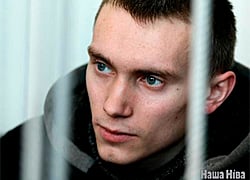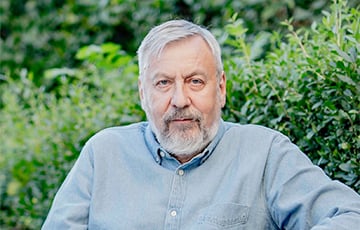Political prisoner Artsyom Dubski remains behind bars
6- 6.03.2009, 14:50

An accusation to Artsyom Dubski, “Young Front” activist and former participant of the Process of 14, has been presented. The oppositionist faces from 6 month to 3 years in prison.
As Tamara Sidarenka, lawyer of the “Young Front” activist told the Charter’97 press center, Artsyom Dubski was been presented accusation under article 415 of the Criminal Code of Belarus (Evading punishment of restriction of liberty) and taken into custody as a measure of restraint. According to the lawyer, she was said Dubski’s case would be investigated within a month, after that a trial would begin.
Artsyom Dubski is kept in the temporary detention facility in Asipovichy now and will be transferred to the pre-trial detention facility #5 in Babruisk soon.
Anastasiya Loika, member of the committee of the repressed people protection “Solidarity”, told in an interview to the Charter’97 press center that Artsyom Dubski faced problem with health in the detention center in Asipovichy.
“Health conditions in the detention facility are awful,” Anastasiya Loika told. “There are 21 people in the cell. Artsyom told most of them had high temperature last Thursday. Dubski took ill last week due to bad health conditions. Parents passed medicines to him. It was seen that he was ill even at the first trial.”
According to Anastasiya Loika, the parents of the arrested youth activist can’t hand over food parcels to him for some days. “They effused to accept parcels on March 5 and 6. They said they no right to do it, because an accusation was to be presented to Artsyom. They referred to article 108 of the Criminal Procedure Code,” Loika said.
As Anastasiya Loika says, after arrest of Artsyom Dubski, there appeared new details new details about warnings for evading serving punishment of restraint of liberty, which were a reason for leaving for Ukraine.
“It’s necessary to understand why Dubski travelled to Ukraine,” Anastasia Loika says. “He had three warning in Belarus. Two of them were falsified. Artsyom Dubski was hiring a flat at that time. There some cases when he as at home when a district militia officer visited him, but on the same day Dubski received telephone calls and militiamen offices said he had been out. In such cases he had to write explanations for militia. After three warnings Dubski had to leave for Ukraine. When he was arrested on February 13 in Homel, he was shown the case. There was just one warning, two others had disappeared. Guards have changed. The previous ones took away two fake warnings.”
A participant of the Process of Fourteen Artsyom Dubski was arrested on February 13 in Homel on his way from Ukraine.
On March 3, he stood a trial in Asipovichy under article 216 Part 1 of the Criminal Code “infliction of material damage without elements of theft”. Artsyom Dubski was charged with using a SIM-card of another person to access the Internet. He owes 3mln Br to Velcom mobile operator.
The oppositionist was released in the court, as the so-called “conciliation of the parties” had taken place: the “party aggrieved” was compensated for the damage.Right after the trial Artsyom Dusbki was seized and guarded to the Asipovichy militia department to a remand prison. He was accused of violation article 415 of the Criminal Code of Belarus (Evading sevign punishment of restraint of liberty).
Process of Fourteen is a case initiated under article 342 of the Criminal Code of Belarus against participants of the peaceful protest rally of businessmen held in Minsk on January 10, 2008.
For participation in this protest a young activist Andre Kim was sentenced to a year and a half in a penal colony (he was released in August 2008). An activist of the civil campaign “European Belarus” Alyaksandr Barazenka was sentenced to 1 year of restriction of liberty without sending him to a penal colony. He was kept in remand jail from October 27 to December 9, 2008. Other participants of the Process of Fourteen – Alyaksei Bondar, Artsyom Dubski, Mikhal Kryvau, Mikhal Pashkevich, Ales Straltsou, Ales Charnyshou, Tatsyana Tsishkevich, Mikhail Subach, and Paval Vinahradau, were sentenced to 2 years of restriction of freedom without sending them to penitentiary institutions. Minor Maxim Dashuk got 1.5 years of restraint of liberty.










